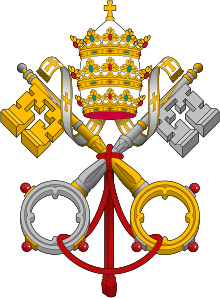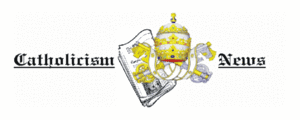Portal:Catholic Church
Introduction The Catholic Church, also known as the Roman Catholic Church, is the largest Christian church, with 1.39 billion baptized Catholics worldwide as of 2022. It is among the world's oldest and largest international institutions, and has played a prominent role in the history and development of Western civilization. The church consists of 24 sui iuris churches, including the Latin Church and 23 Eastern Catholic Churches, which comprise almost 3,500 dioceses and eparchies located around the world. The pope, who is the bishop of Rome, is the chief pastor of the church. The Diocese of Rome, known as the Holy See, is the central governing authority of the church. The administrative body of the Holy See, the Roman Curia, has its principal offices in Vatican City, a small independent city-state and enclave within the Italian capital city of Rome, of which the pope is head of state. The core beliefs of Catholicism are found in the Nicene Creed. The Catholic Church teaches that it is the one, holy, catholic and apostolic church founded by Jesus Christ in his Great Commission, that its bishops are the successors of Christ's apostles, and that the pope is the successor to Saint Peter, upon whom primacy was conferred by Jesus Christ. It maintains that it practises the original Christian faith taught by the apostles, preserving the faith infallibly through scripture and sacred tradition as authentically interpreted through the magisterium of the church. The Roman Rite and others of the Latin Church, the Eastern Catholic liturgies, and institutes such as mendicant orders, enclosed monastic orders and third orders reflect a variety of theological and spiritual emphases in the church. Of its seven sacraments, the Eucharist is the principal one, celebrated liturgically in the Mass. The church teaches that through consecration by a priest, the sacrificial bread and wine become the body and blood of Christ. The Virgin Mary is venerated as the Perpetual Virgin, Mother of God, and Queen of Heaven; she is honoured in dogmas and devotions. Catholic social teaching emphasizes voluntary support for the sick, the poor, and the afflicted through the corporal and spiritual works of mercy. The Catholic Church operates tens of thousands of Catholic schools, universities and colleges, hospitals, and orphanages around the world, and is the largest non-government provider of education and health care in the world. Among its other social services are numerous charitable and humanitarian organizations. (Full article...) Selected article
 A papal conclave is a meeting of the College of Cardinals to elect the Pope of the Roman Catholic Church (or Bishop of Rome) who is considered by Catholics to be the Successor of Saint Peter and head of the Church. A history of political interference in these elections and consequently long vacancies between popes, and most immediately the interregnum of 1268-1271, prompted the Second Council of Lyons which decreed in 1274 that the electors should be locked in seclusion cum clave (Latin for "with a key"), and not permitted to leave until a new Bishop of Rome is elected. Conclaves are now held in the Sistine Chapel in the Palace of the Vatican. In the early centuries of Christianity the bishop of Rome (like other bishops) was chosen by the consensus of the clergy and people of Rome. The body of electors was more precisely defined when, in 1059, the College of Cardinals was designated the sole body of electors. Since then other details of the process have developed. In 1970 Pope Paul VI limited the electors to cardinals under 80 years of age.
Selected image
 Credit: JeremyA Our Lady of Sorrows Basilica (officially: The Basilica Of Our Lady Of Sorrows) is a Roman Catholic house of worship in the west side neighborhoods of Chicago, Illinois in the United States. Located at 3121 West Jackson Boulevard, it is along with St. Hyacinth and Queen of All Saints, one of only three churches in Illinois designated by the Pope with the title of basilica. Selected biography
 Bede (/biːd/; c. 672 or 673 – May 25, 735), also Saint Bede, the Venerable Bede, or (from Latin and Old English) Beda (Old English pronunciation: [ˈbeːdɑ]), was a Benedictine monk at the Northumbrian monastery of Saint Peter at Monkwearmouth, today part of Sunderland, and of its companion monastery, Saint Paul's, in modern Jarrow (see Wearmouth-Jarrow), both Northumbria. He is well known as an author and scholar, and his most famous work, Historia ecclesiastica gentis Anglorum (The Ecclesiastical History of the English People) gained him the title "The father of English history". Bede became known as Venerable Bede (Lat.: Beda Venerabilis) soon after his death, but this was not linked to consideration for sainthood by the Roman Catholic Church. In fact, his title is believed to come from a mistranslation of the Latin inscription on his tomb in Durham Cathedral, intended to be Here lie the venerable bones of Bede, but wrongly interpreted as here lie the bones of the Venerable Bede.
Did you know...
Related portalsFeast Day of June 1
Most of his works are lost, but two apologies and a dialogue did survive. The First Apology, his most well-known text, passionately defends the morality of the Christian life, and provides various ethical and philosophical arguments to convince the Roman emperor, Antoninus, to abandon the persecution of the Church. Further, he also indicates, as St. Augustine would later, regarding the "true religion" that predated Christianity, that the "seeds of Christianity" (manifestations of the Logos acting in history) actually predated Christ's incarnation. This notion allows him to claim many historical Greek philosophers (including Socrates and Plato), in whose works he was well studied, as unknowing Christians. (Full article...)
Selected quote
News
SubcategoriesTopics
The Holy Bible:
Particular Churches (grouped by liturgical rite):
Things you can do
External resourcesWikiProjectsAssociated WikimediaThe following Wikimedia Foundation sister projects provide more on this subject:
Discover Wikipedia using portals |


































